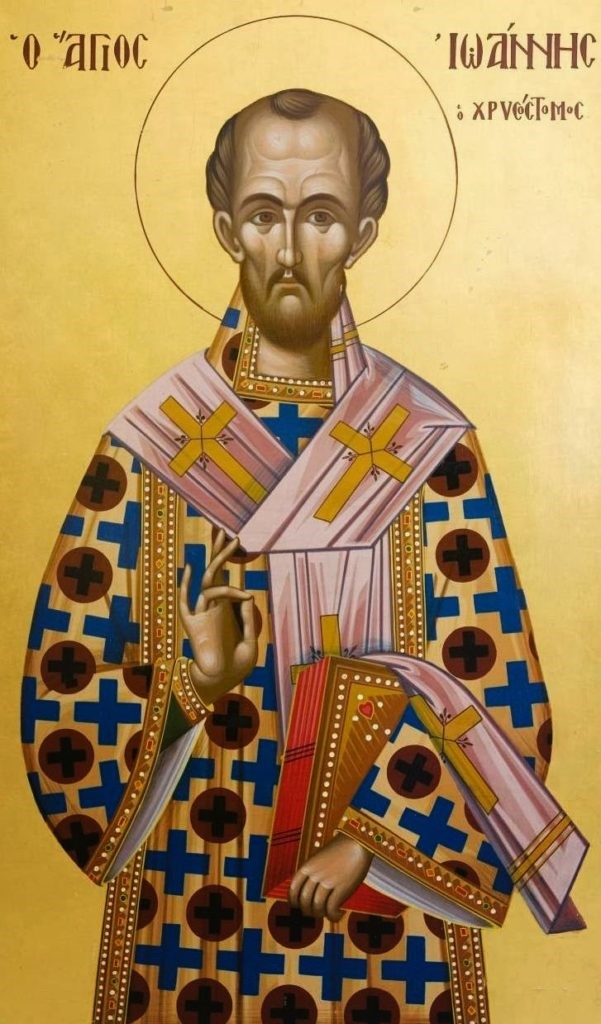St John Chrysostom, born in Antioch about 347 AD, was a great genius. His powerful eloquence earned him the surname of Chrysostom, or golden mouth. With St Athanasius, St Gregory Nazianzen and St Basil, he forms the group of the four great doctors of the Eastern Church. As Archbishop of Constantinople, his courageous stance against the vices of even the wealthy caused him to be exiled several times. As a result he died in 407, still in exile. In 1204 his body was brought to St Peter’s in Rome but was returned to the Orthodox on November 27, 2004 by Pope John Paul II. His silver and jewel-encrusted skull is now kept in the Vatopedi Monastery on Mount Athos in northern Greece, and is credited by Christians with miraculous healings. His right hand is also preserved on Mount Athos, and numerous smaller relics are scattered throughout the world. His feast in the Extraordinary Form of the Roman Rite is celebrated on January 27.
John Chrysostom was the son of a Latin father and a Greek mother; his mother, Anthusa, was widowed at the age of twenty, soon after his birth. Putting aside all thought of remarriage, Anthusa gave all of her attention to her son: she gave him the best classical education of the day, and enrolled him as a catechumen when he was eighteen. He came under the influence of Meletius, patriarch of Antioch, who sent him to the monastic school of Diodore, then baptized him and ordained him lector.
At this time, St John Chrysostom decided to take his future into his own hands and became a monk-hermit, living in a cave, studying the Scriptures, and putting himself under the discipline of an old hermit named Hesychius. However, his health broke under this austere regimen and he returned to Antioch, was ordained a priest, and began his remarkable career as a preacher.
During the next twelve years, he electrified Antioch with his fiery sermons, filled with knowledge and an eloquence that were astonishing. It was during this period that he received the nickname Chrysostom, or golden mouth, for his words seemed to be pure gold. In 397, when the See of Constantinople became vacant, the Emperor Arcadius appointed John patriarch, and since it was feared that he would refuse the honor, he was lured to Constantinople and consecrated bishop of the city in 398.
John found himself in a nest of political intrigue, fraud, extravagance, and naked ambition. He curbed expenses, gave lavishly to the poor, built hospitals, reformed the clergy, and restored monastic discipline. But his program of reform made him enemies, in particular the Empress Eudoxia and the Patriarch Theophilus of Alexandria. The city in turmoil, his life threatened, John was exiled by the emperor in the year 404.
The papal envoys were imprisoned, and John — defended by the pope and ordered restored to his see — was sent further into exile, six hundred miles from Constantinople, across the Black Sea. Worn out and sick, he died of his hardships at Comana in Pontus. His last words were, “Glory to God for all things.”
Excerpted from www.catholicculture.org Tej Francis
Email: tejfrancis@gmail.com


 Follow
Follow


